Serving 332 students in grades Kindergarten-6, Wasatch School ranks in the top 20% of all schools in Utah for overall test scores (math proficiency is top 20%, and reading proficiency is top 20%).
The percentage of students achieving proficiency in math is 53% (which is higher than the Utah state average of 39%). The percentage of students achieving proficiency in reading/language arts is 56% (which is higher than the Utah state average of 43%).
The student:teacher ratio of 21:1 is equal to the Utah state level of 21:1.
Minority enrollment is 36% of the student body (majority Hispanic), which is higher than the Utah state average of 29% (majority Hispanic).
Quick Stats (2025)
- Grades: Kindergarten-6
- Enrollment: 332 students
- Student:Teacher Ratio: 21:1
- Minority Enrollment: 36%
- Overall Testing Rank: Top 20% in UT
- Math Proficiency: 53% (Top 20%)
- Reading Proficiency: 56% (Top 20%)
- Science Proficiency: 65-69% (Top 5%)
- Source: National Center for Education Statistics (NCES), UT Dept. of Education
Top Rankings
Wasatch School ranks among the top 20% of public schools in Utah for:
Category
Attribute
Overall Rank
Math Proficiency
Reading/Language Arts Proficiency
Science Proficiency
School Overview
Wasatch School's student population of 332 students has declined by 25% over five school years.
The teacher population of 16 teachers has declined by 23% over five school years.
Grades Offered
Grades Kindergarten-6
Total Students
332 students
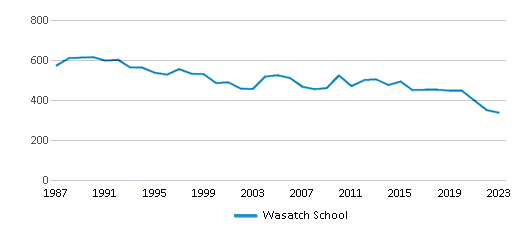
Gender %
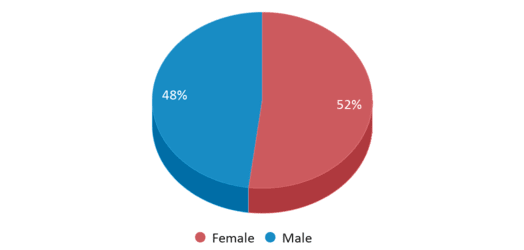
Total Classroom Teachers
16 teachers
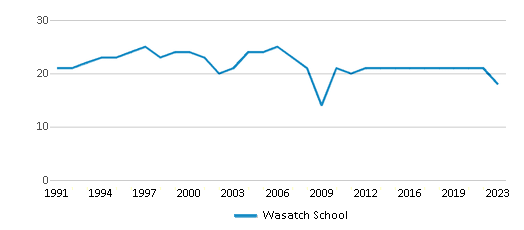
Students by Grade
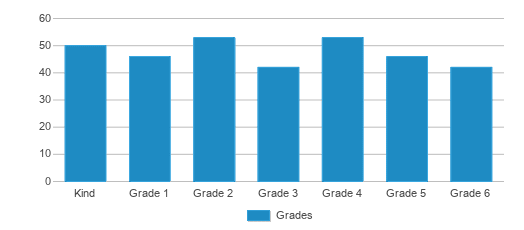
School Rankings
Wasatch School ranks within the top 20% of all 975 schools in Utah (based off of combined math and reading proficiency testing data).
The diversity score of Wasatch School is 0.56, which is more than the diversity score at state average of 0.46. The school's diversity has stayed relatively flat over five school years.
Overall Testing Rank
#141 out of 975 schools
(Top 20%)
(Top 20%)
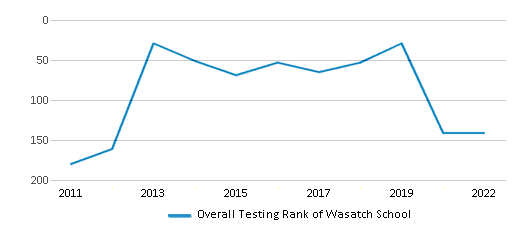
Math Test Scores (% Proficient)
(20-21)53%
39%
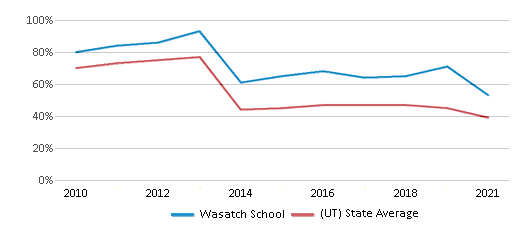
Reading/Language Arts Test Scores (% Proficient)
(20-21)56%
43%
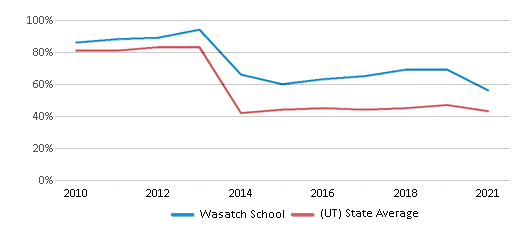
Science Test Scores (% Proficient)
(20-21)65-69%
45%
Student : Teacher Ratio
21:1
21:1
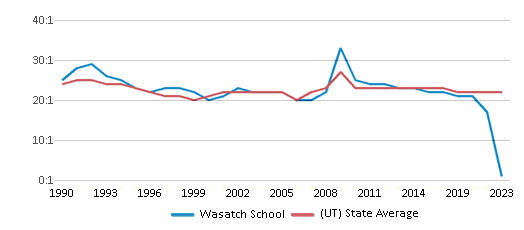
American Indian
1%
1%
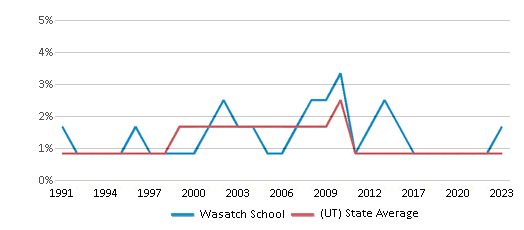
Asian
5%
2%
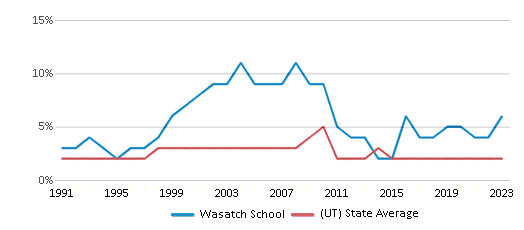
Hispanic
13%
20%
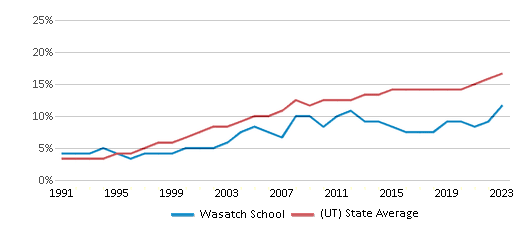
Black
5%
1%
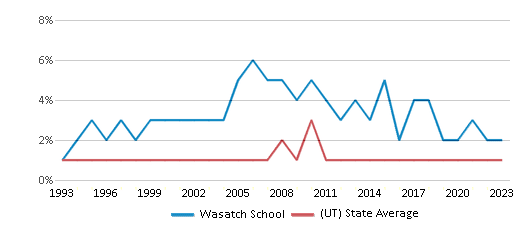
White
64%
71%
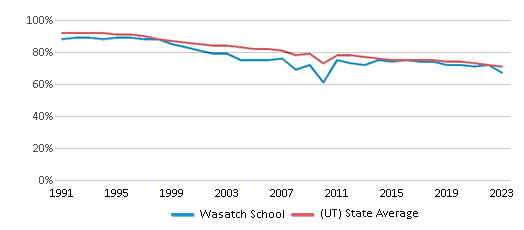
Hawaiian
1%
1%
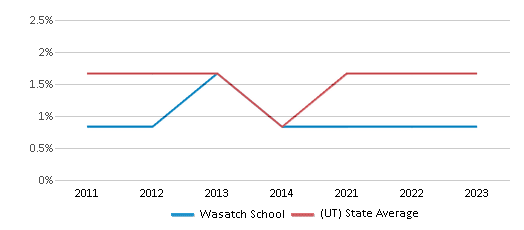
Two or more races
11%
4%
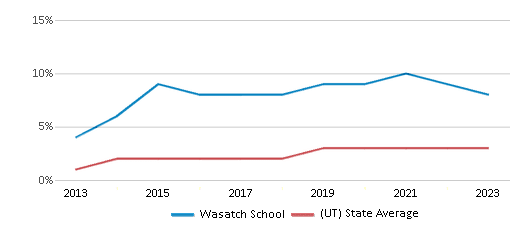
All Ethnic Groups
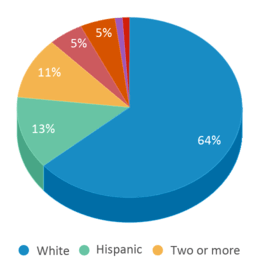
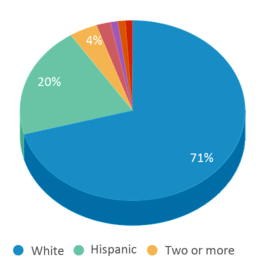
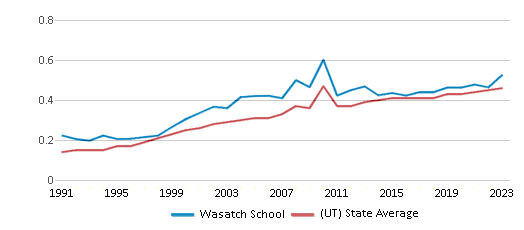
Eligible for Free Lunch
34%
24%
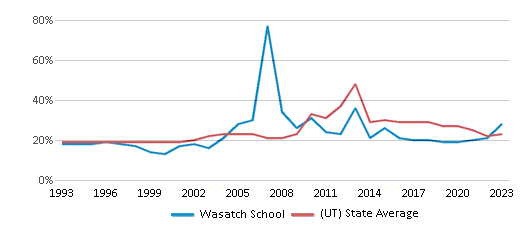
Eligible for Reduced Lunch
3%
6%
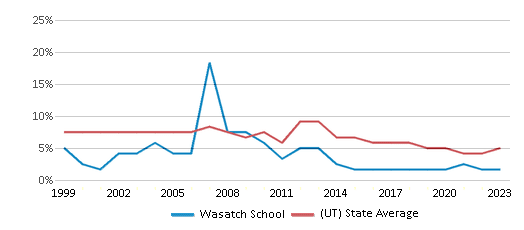
School Statewide Testing
School District Name
Source: National Center for Education Statistics (NCES), UT Dept. of Education
Profile last updated: 02/09/2025
Frequently Asked Questions
What is Wasatch School's ranking?
Wasatch School is ranked #141 out of 975 schools, which ranks it among the top 20% of public schools in Utah.
What schools are Wasatch School often compared to?
Wasatch Schoolis often viewed alongside schools like Beacon Heights School, Uintah School by visitors of our site.
What percent of students have achieved state testing proficiency in math and reading?
53% of students have achieved math proficiency (compared to the 39% UT state average), while 56% of students have achieved reading proficiency (compared to the 43% UT state average).
How many students attend Wasatch School?
332 students attend Wasatch School.
What is the racial composition of the student body?
64% of Wasatch School students are White, 13% of students are Hispanic, 11% of students are Two or more races, 5% of students are Asian, 5% of students are Black, 1% of students are American Indian, and 1% of students are Hawaiian.
What is the student:teacher ratio of Wasatch School?
Wasatch School has a student ration of 21:1, which is equal to the Utah state average of 21:1.
What grades does Wasatch School offer ?
Wasatch School offers enrollment in grades Kindergarten-6
What school district is Wasatch School part of?
Wasatch School is part of Salt Lake School District.
In what neighborhood is Wasatch School located?
Wasatch School is located in the The Avenues neighborhood of Salt Lake City, UT. There are 3 other public schools located in The Avenues.
School Reviews
4 11/2/2018
Very happy with Wasatch! The principal, Ms Candler, is incredibly organized and energetic. She is a savvy advocate for the teachers and students. She knows the name of every child in the school and is doing daily rounds in all the classrooms - she has a great pulse on what's happening "on the ground," down to the smallest child's need. But she also sees big picture goals and can effectively navigate the large systems around Wasatch. The ambitious PTA raises well over 50K/year to support the teachers and programs, which makes this a very well funded school, with all the advantages that come with excellent funding. Unlike many schools that are cutting even basic programs, Wasatch has full library services, physical education, Playworks during recess, a fully staffed computer lab and roaming computer access, not to mention a very extensive arts programs. Their arts program includes and surpasses the Tanner Fine Arts grant, with dance, visual arts, 4th grade and up band, music, and even little theater performances. There are screenings and resources offered to kids of all needs - including the PTA paying for a vision assessment and providing free eyeglasses to children in need, as well as on site counseling support services. The community spirit is strong with Halloween carnivals, back to school BBQ's, and a huge Arts Showcase that is a total delight. The teachers are enthusiastic, experienced, and engaging. Ms Candler is very wise in her hiring process and goes above and beyond to attract and maintain the best teachers. Parents are artistic, involved, and welcoming. An awesome school.
Review Wasatch School. Reviews should be a few sentences in length. Please include any comments on:
- Quality of academic programs, teachers, and facilities
- Availability of music, art, sports and other extracurricular activities
Recent Articles

What Is A Charter School?
Explore the world of charter schools in this comprehensive guide. Learn about their history, how they operate, and the pros and cons of this educational innovation. Discover key facts about charter schools, including admission policies, demographics, and funding, as well as what to look for when considering a charter school for your child.

10 Reasons Why High School Sports Benefit Students
Discover the 10 compelling reasons why high school sports are beneficial for students. This comprehensive article explores how athletics enhance academic performance, foster personal growth, and develop crucial life skills. From improved fitness and time management to leadership development and community representation, learn why participating in high school sports can be a game-changer for students' overall success and well-being.

February 05, 2025
Understanding the U.S. Department of Education: Structure, Impact, and EvolutionWe explore how the Department of Education shapes American education, from its cabinet-level leadership to its impact on millions of students, written for general audiences seeking clarity on this vital institution.





